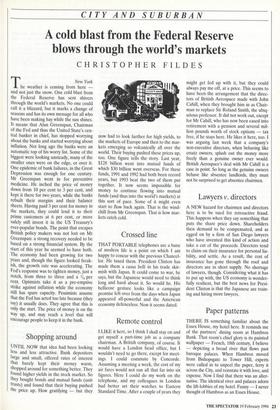Remote control
I LIKE it here, so I think I shall stay on and get myself a part-time job as a company chairman. A British company, of course. It would have a London head office, but I wouldn't need to go there, except for meet- ings. I could commute by Concorde. Assuming a meeting a week, the cost of my air fares would not run all that far into six figures. Here I could do my work on the telephone, and my colleagues in London had better set their watches to Eastern Standard Time. After a couple of years they
might get fed up with it, but they could always pay me off, at a price. This seems to have been the arrangement that the direc- tors of British Aerospace made with John Cahill, when they brought him in as Chair- man to replace Sir Roland Smith, the ubiq- uitous professor. It did not work out, except for Mr Cahill, who has now been eased into retirement with a pension and several mil- lion pounds worth of stock options — tax free, if he stays here. He likes it here, too. I was arguing last week that a company's non-executive directors, when behaving like ersatz owners, splash out the money more freely than a genuine owner ever would. British Aerospace's deal with Mr Cahill is a case in point. So long as the genuine owners behave like absentee landlords, they must not be surprised to get absentee chairmen.


















































 Previous page
Previous page